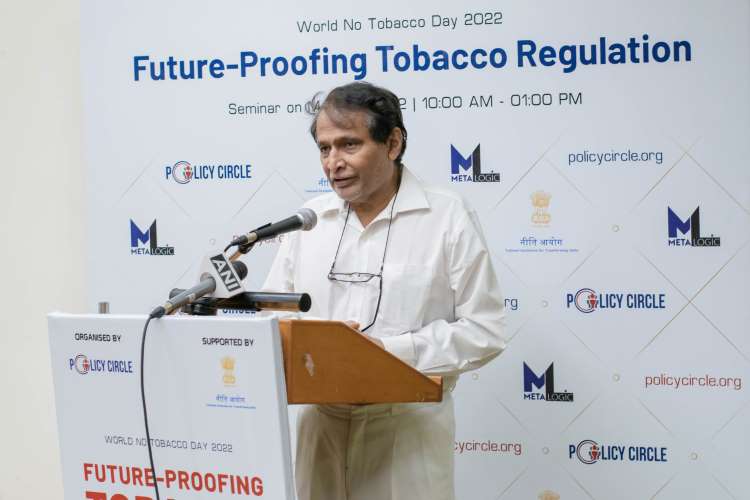Effective tobacco regulation requires holistic solutions including better de-addiction centres as bans do not stop an addict from consumption, said former commerce minister Suresh Prabhu. He was discussing the hurdles faced by the government in bringing down tobacco consumption without impacting the livelihoods of farmers and workers employed by the industry at a seminar on tobacco regulation organised by Policy Circle on Monday.
Former Rajya Sabha MP Rajeev Gowda said it is almost impossible to stop tobacco manufacturing in the country. He cited studies published in the UK and the US that showed harm reduction is the way to go for tobacco regulation. He also explained the reasons why he opposed the ENDS Ban Bill when it was debated in the Rajya Sabha in 2019.
READ I Explainer: Supreme Court ruling recognises sex work as a legal profession
Aruna Sharma, former secretary, ministry of steel, who chaired the conference, Future-proofing Tobacco Regulation, said that the government should take into account scientific evidence while making policies. She said, those who struggle to quit tobacco use should be provided with help in the form of viable alternatives.
In India, all tobacco products are regulated under the Cigarettes and Other Tobacco Products (Prohibition of Advertisement and Regulation of Trade and Commerce, Production, Supply and Distribution) Act which came into force in 2003. COTPA regulates products such as cigarettes, cigars, beedis, chewing tobacco, and pan masala.
READ I ‘India should produce smallpox vaccines to combat monkeypox’
There is a blanket ban on all kinds of innovative products such as e-cigarettes. The ENDS Ban Act treats all such products are electronic devises, and not tobacco products. A notable anomaly is heat not burn products that are bundled together with e-cigarettes when they actually are tobacco products and should come under COTPA.
Dr Madan Gopal, senior advisor at Niti Aayog, called for strong measures to reduce tobacco consumption, but conceded that ban is not the answer to the problem as it creates illicit markets for banned products. He said the government does not have a system in place to effectively implement the regulation.
Dr MC Mishra, former director, AIIMS, said a tobacco-free world is not a realistic objective. The regulations must be made with the understanding that it is impossible to end tobacco use altogether.
Eminent lawyer Lalit Bhasin said the ban on e-cigarettes and other innovative products is unconstitutional. He said powers given to the legislature are for exercising control and not for imposing bans. He said even COTPA is an enabling law that provides directions.
Dr Nimesh Desai, a leading psychiatrist, said the tobacco regulation efforts need to bring focus on the adverse impact of passive smoking. He said the government has come up with various measures like prohibition of smoking in public places and societal pressure played a role in adopting strict regulation.
Bejon Kumar Mishra highlighted the need for an informed consumer choice. He said the consumer knows what is good or bad for them and that they must be allowed to decide for themselves. He said developed countries like Hong Kong and Japan saw a fall in tobacco consumption with harm reduction helped the smokers switch to alternatives. He said unilateral bans by governments without consulting the most important stakeholders – the consumers – reeked of prejudice and vested interests.
The views of speakers were hotly contested by an audience comprising policy makers, senior doctors, lawyers and journalists. The lively debate brought to the fore divergent perspectives on some of the topics.

